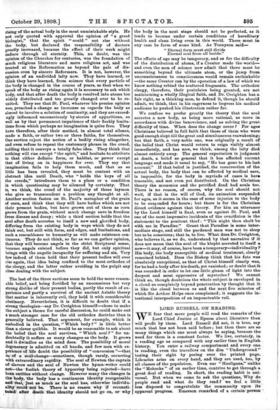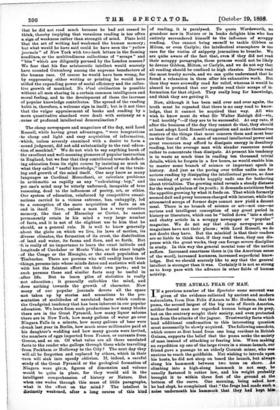LORD RUSSELL ON READING.
WE fear that more people will read the remarks of the- Lord Chief Justice at Epsom about literature than will profit by them. Lord Russell did not, it is true, say much that has not been said before ; but then there are so many things which one must always be saying, because the need for them is a constant factor. We live, certainly, in a reading age as compared with any earlier time in English history. You enter a railway compartment and every one is reading, even the travellers on the dim "Underground" taxing their sight by poring over the printed page. Libraries arise on every hand, and they are used, too, by all classes of the population. Even our "Hooligans," unlike the "Mohocks " of an earlier time, contrive to get through a great deal of reading. In short, the reading habit is uni- versal. But when we come to ask the questions, Why do people read and what do they read P we feel a little less disposed to congratulate the community upon its apparent progress. Emerson remarked of a certain person '
that he did not read much because he had not ceased to think, thereby implying that voracious reading is too often a sign of weakness rather than strength of mind. Plato held that the art of writing had weakened the human memory ; but what would he have said could he have seen the yellow journals" of New York with two-inch letters in the flaming headlines, or the multitudinous collections of " scraps " and bits " whioh are diligently perused by the London masses ? We fear that his fine aristocratic intellect would scarcely have counted Gutenberg among the supreme benefactors of the human race. Of course he would have been wrong, for by suppressing either writing or printing he would have stifled the expanding power of social efficiency and the collec- tive growth of mankind. No Peal civilisation is possible without all men sharing in a certain common intelligence and moral feeling, and to the development of these the increase of popular knowledge contributes. The spread of the reading habit is, therefore, a welcome sign in itself ; but is it not time that the vulgar appraisement of books and reading by a mere quantitative standard were dealt with seriously as a • cause of profound intellectual demoralisation ?
The cheap newspapers and magazines of the day, said Lord Russell, while having great advantages, " were temptations 'to cheap and light and easy acquisition of information, - which, unless severely examined with a desire to form a sound judgment, did not add substantially to the real educa- tion of mankind." We do not wish to say anything harsh of the excellent and well-meaning pioneers of popular instruction in England, but we fear that they contributed towards deflect- ing education from its right course by insisting so much on what they called " useful knowledge," instead of on the train- ing and growth of the mind itself. One may know as many languages as Cardinal Mezzofanti, or calculate problems in arithmetic as rapidly as any "calculating - boy," and yet one's mind may be utterly unformed, incapable of true reasoning, dead to the influences of poetry, art, or ethics. Our system of education, reinforced by competitive exami- nations carried to a vicious extreme, has, unhappily, led to a conception of the mere acquisition of facts as an end in itself. Now, unless a man has a very retentive memory, like that of Macaulay or Cuvier, he cannot permanently retain in his mind a very large number of facts, and it is not of the slightest use to him that he should, as a general rule. It is well to know generally about the globe on which we live, its laws of motion, its diverse climates, the formation of its crust, the distribution of land and water, its fauna and flora, and so forth. But - rt is really of no importance to learn the exact latitude and longitude of Candahar or Monte Video, or the exact length - of the Congo or the Hoangho, or the exact population of Timbnctoo. There are persons who will readily learn these ,:things, persons into whose minds dates and statistics will sink with but the faintest effort on their own parts; and to such persons these and similar facts may be useful in
. after life. But to learn piles of statistics is really mot education ; it generally enfeebles the mind, and -does nothing towards the growth of character. Now many of our popular journals devote all the space mot taken up by stories and sensations to the pre- sentation of multitudes of unrelated facts which confirm the Gradgrind tendency that has been inherent in our popular education. We learn from such productions how many blocks there are in the Great Pyramid, bow many liquor saloons
there are in New York, how many gallons of water go over Niagara Falls in a minute, how many gallons of beer were drunk last year in Berlin, how much some millionaire paid at his daughter's wedding and bow many guests were invited, the numbers of eggs imported from France, or currants from Greece, and so on. Of what value are all these unrelated facts to the reader who gallops through them while travelling from Peckham or Holloway to the City ? The next day they 'will all be forgotten and replaced by others, which in their .turn will sink into speedy oblivion. If, indeed, a careful -study of the Great Pyramid or the geological formation of Niagara were givai, figures of dimension and volume would be quite in place, for they would aid in the intelligent comprehension of history or Nature. But when one wades through this mass of little paragraphs, what is the effect on the mind ? The intellect is distinotly weakened, after a long course of this kind of reading, it is paralysed. To quote Wordsworth, no grandeur now in Nature or in books delights him who has entirely surrendered himself to the influence of scrappy reading. One cannot bring oneself to tackle Gibbon or Milton, or even Carlyle; the intellectual atmosphere is too rare for the victim of snippety journalism to breathe. We are quite aware of the fact that, even if they did not read their scrappy paragraphs, these persons would not be likely to devour Gibbon, Milton, or Carlyle, and we do not say that all reading should be confined to high classics. Darwin read the most trashy novels, and we can quite understand that he found a relaxation in them after his exhaustive work. But then they were avowedly read for relief, whereas it would be absurd to pretend that our youths read their scraps of in- formation for that object. They really long for knowledge, and think they are getting it.
Now, although it has been said over and over again, the truth must be repeated that there is no easy road to know- ledge, that it cannot be acquired that way. All who wish to know must do what Sir Walter Raleigh did—viz., " toil terribly "—if they are to be successful. At any rate, if after the business of the day they cannot do that, they should at least adopt Lord Russell's suggestion and make themselves masters of the things that most concern them and most bear on their line of life. A man of unusual intellectual power and great resources may afford to dissipate energy in desultory reading, but the average man with slender resources needs rather to concentrate than dissipate. At present his tendency is to waste as much time in reading ten thousand trivial details, which be forgets in a few hours, as would enable him to master some branch of science or important epoch in history. And just as the poring over trifles unfits one for serious reading by dissipating the intellectual powers, so does the reading of great works happily unfit one for bothering about trivialities. The growing mind reveals a steady distaste for the weak pabulum of its youth ; it demands nutritious food the appetite growing by what it feeds on. That which formerly seemed dull and prosy becomes charged with interest, while the attenuated scraps of former days cannot now yield a decent meal. There is no branch of science or art—not one—no serious and intelligent conception of any great period in history or literature, which can be " boiled down " into a short and chatty article in a scrappy newspaper or " popular " magazine. We do not say that cheap newspapers and magazines have not their places ; with Lord Russell, we do not doubt they have. But the mischief is that their readers are so liable to think that, if they read them, they can dis- pense with the great works, they can forego severe discipline in study. In this way the general mental tone of the nation suffers. Increased smartness there is (in the American sense of the word), increased keenness, increased superficial know- ledge. But we should scarcely like to say that the general intellect is stronger than it was. Certainly it is not so strong as to keep pace with the advance in other fields of human activity.







































 Previous page
Previous page